
Ryan Berg ’19, an exercise science major and football player from Aurora, Illinois, expected to have a little fun along with his studies during his semester abroad.
Did he? He’s so laid back it can be hard to tell.
“I went to Paris and ate escargot,” he relates in a no-big-deal deadpan. “Brussels had great waffles,” he muses. “I spent a week in Rome. That was cool.”
But if you want to really light the guy up, ask him about the time he and his fellow Central program mates performed the opening quadrille at the ball at the Vienna City Hall.
SUPERLATIVES FAIL
“It was awesome! It was sick! It was amazing!” he enthuses. “We all dreaded it, right up until the day it happened. But it was like prom, only 10 times better!”
He calms down a bit. “We actually did something really important. They announced to everyone, ‘We have a group of American students here!’ The entire audience was watching. We’d only had three sessions to learn the dances. None of us are dancers. And the class was in German.
“I was dancing with one of our instructors because there weren’t enough partners to go around. He seemed surprised I knew what I was doing.
“‘Do you speak German?’ he asked.
“I laughed and said, ‘Not enough! I learned this entire dance by watching you!’”
“We were doing the quadrille in full costume with two lines and six different dances to remember. There were so many people that we kept colliding. Someone knocked over a plant. We kept going until 2 a.m. I sweated more than in a football game.” He pauses. “But it was So! Much! Fun!”
Vienna program participants dressed for the ball. Click to view photos.

Vienna Opera House
“IT CHANGES YOUR LIFE”
That’s by design, says Ruth Verweijen, Central’s Vienna program site director for the past 18 years. It’s one thing to read about the place of formal dance in the culture of a city that produced some of the world’s greatest music. It’s something else to dress the part of the Viennese elite and perform for them. For a magic moment, the students say, you become someone else entirely. And you never fully return to the person you were before.
“Having done this, I’m more likely to take a leap in the future,” Berg says.
Everyone nods. More than a dozen students are sitting in the lounge of Central’s offices at the Campus of the University of Vienna, eating take-out pizza and talking about what they’d learned while studying abroad.
The consensus: “Way more—about way more—than we ever expected.”
Dillon Maass ’20 from Freedom, Wisconsin, studies social science and secondary education at Central. “I learned a lot from things I didn’t plan on doing,” he says. “Dancing in the ball. Walking across Lichtenstein.”
Erin Dilger ’20 from Tinley Park, Illinois, taught English to refugee children from Afghanistan and Syria in Vienna, working with other volunteers from all over the world. She was amazed and empowered to find that she could communicate, teach and support people with whom she initially thought she had nothing in common.
“Even though people come from really different places, there are more similarities than differences,” she says. “It sounds like a cliché until you experience it. Then it changes your life.”
For some, just learning they could navigate a foreign city was huge. “I’m from a town of 800 people,” says Hannah Miller ’18, a communications studies graduate from Newhall, Iowa, who is now an intern with an event and wedding planner. “I’ve never been on a train in my life. I got lost. I was freaking out. But I figured it out, and now I’m doing pretty well. I got to see myself change.”
Berg suddenly found himself more empathetic. “Going to the grocery store at home I’d see an immigrant struggling and think ‘Dude, just learn the language!’ Here, I am that guy. I understand more of what it is like for others now.”
“Self-reflection is a central piece of the re-entry course students take when they get back to campus. This is the type of critical thinking we want students to walk away with.”
— Matthew Kaye, Assisstant Dean of International Education
NOT ONLY IN VIENNA
Central has been a study-abroad leader for decades. It has five well-established, director-led programs.
Central’s other study abroad experiences all have resident directors who are Central College employees. All mirror Central’s on-campus emphasis of rigorous academics, a supportive community and experiential learning, to which each location adds its own twist. Each requires a course about the location of the program and offers internships and other immersive experiences.
- Vienna
- London
- Wales
- Granada
- Mérida
LONDON
Students are based at the University of Roehampton, a modern liberal arts university 30 minutes from central London. It affords easy access to all that this world center of finance, theatre and trade has to offer.
WALES
The program, headquartered at large, international Bangor University, is located in a region with more castles per square mile than anywhere else in the world. Wales is also a mecca for outdoor enthusiasts. Students enjoy exploring the region’s history, plus weekly trips to hike, climb, canoe, mountain bike and canyoneer.
GRANADA
Students with intermediate- to advanced-level Spanish language skills live in the city with host families and study at the University of Granada. Students cite the local cultural immersion and a four-day trip to Morocco as favorite experiences.
MÉRIDA
The only program taught by visiting Central faculty members, it doesn’t require students to speak Spanish when they arrive. They quickly come to understand Mexico from a Mexican perspective in a 4,000-year-old Mayan city in the Yucatán.
“POSSIBILITIES THEY NEVER IMAGINED”
“They experience the world opening and see possibilities for themselves they never imagined,” Verweijen says. Seeing students become more confident, self-reliant and cosmopolitan is why she’s here. A Vienna native who earned a master’s degree in international intercultural management at the School for International Training in Vermont on a Fulbright scholarship, she’s ideally suited to the job of engineering transformational cultural experiences.
Central students take classes at the university (some in German, some in English; students need not speak German upon arrival).

Christian Escobar ’20 talks with Vienna
program director Ruth Verweijen in
her office.
“We have opportunities for most majors because you can take any class at the university except those in the medical school,” Verweijen says.
She also co-teaches a course in Austrian history and culture that all program students take. She leads immersive field trips—to concerts, the ball, to the Wachau Valley to view castles, wineries and small villages along the Danube. And she helps facilitate internships with businesses and other organizations in Vienna.
“Seventeen out of 19 students in the program this spring did internships,” Verweijen says. “That’s very important. Doing an internship abroad shows real initiative, plus the skills you learn.”
Internships—including a couple with the hot new startup thinktank World Data Lab, a real coup to arrange—are set up by the Vienna program’s Associate Director Michaela Maschek. She also teaches a German idiomatics, stylistics and grammar course, tutors students in German and “just lends an ear whenever anyone needs one,” says Verweijen. Alexander Eberhard, a Viennese violinist, composer and sound artist has taught music appreciation to Central students in Vienna for 17 years. He conducts much of the class from the piano, effortlessly demonstrating various styles and engaging students in a discussion of music and creativity, history and culture.
“The interesting thing about Central students is that they are coming from different places in the States, and they are studying completely different subjects: sociology, economics and creative writing,” he says. “European students would only be studying music.” The result, he says, is wide-ranging class discussion with an interdisciplinary perspective he enjoys—and that makes his course a perennial favorite with students.
LIVING IN A WORLD CAPITAL
Perhaps the program’s biggest draw is the city of Vienna itself. As seat of a once-vast empire, it accumulated knowledge and treasures from around the world —and preserved them in the form of the castles, gardens, museums and monuments that permeate the city. Just living in the midst of it all is an education.
Students say once you get your bearings, navigating Vienna is easy. Signage is excellent and often in English —a language everyone seems to speak fluently. From store clerks to public officials to people on the street, Viennese take care of visiting foreigners like it’s their job—and with sincerity and class.
Separate but parallel traffic systems for vehicles, streetcars, bicycles and pedestrians allow for wonderfully efficient transport (there are also buses and a subway system). But walking is a particular delight, with:
- A music walk that celebrates classical composers as Hollywood does movie stars.
- A 12th-century cathedral.
- Palaces surrounded by formal gardens and dripping with gold leaf, frescos and rococo details.
- A natural history museum that takes up a virtual city block and allows you to navigate the world without leaving its walls.
- An art museum that’s just as grand and wide-ranging.
In spite or because of it all, the pace seems more relaxed than in large U.S. cities, with world-famous street markets and cafés that implore you to plunk down for some famous Viennese meats, sweets or coffees.
It’s enough to make students think twice about where they want to live next. Shannon James ’19, a business major from tiny St. Charles, Iowa, interned at an international finance consulting company in Vienna that increased her excitement about starting a career.
“Here or in the States?” someone asks.
She pauses. “I’ll have to think about that,” she says.
NOT ONLY FOR A SEMESTER
For some students, a semester abroad isn’t the right fit, so Central offers other options.
Cheyanna Jennings ’20 from Hermitage, Missouri, is an athletic training major, a softball player and serves in the National Guard.
Then Jennings heard about Philosophy 390: Memory and the Holocaust taught by Assistant Professor of Philosophy Mark Thomas. It included a 14-day trip to Germany and Poland during spring break 2018 that included visits to concentration camps, memorials, museums and synagogues.

Cheyanna Jennings ’20 views photographs of Holocaust
victims at the Auschwitz Jewish Center, Oświęcim, Poland.
Photo: Amy Young
The course and her travels were transformative. “Now,” she says. “I want to add a minor in philosophy.”
Thomas and Associate Professor of German Amy Young co-designed the trip. It was open to Thomas’ students and to students in Young’s course, The Holocaust. That class focused on German literature about the Holocaust and was taught largely in German.
The courses were designed to introduce students to the subject via readings and discussions on campus, then immerse them in it during the trip—all while giving them a chance to reflect on what they’d learned and how it affected their own sense of history and literature.
Kendra Schwery ’18, a business management and communication studies double major from Harlan, Iowa, says that knowing the trip was coming “made me more dedicated to the course material. I wanted to be informed when I got there.”
Elizabeth Morey ’20, a philosophy and religion double major from Altoona, Iowa, says nothing could have fully prepared her for what she saw. “The scale! Auschwitz is huge. 1.5 million people died there. I’ve never seen 1.5 million of anything. The vastness of it…” her voice trails off.
The concentration camp visits made history real, Jennings says, but their study and experience of it as a class kept it from emotionally paralyzing them. “So many people going to the camps disassociate,” she adds. “You can see it on their faces. But because we were doing it together, we could talk through the horror and the sad feelings and stay present.”
“It gave us the opportunity to understand, not just react,” Morey says. “But everyone cried at the reflection sessions.”
Thomas and Young carefully designed the trip to introduce students to memorials of German-Jewish culture as they existed before the Holocaust so students could understand what was lost. Then came the camp visits, and finally, visits to synagogues to see how the culture had been changed. The 11 students and two professors also performed service, cleaning some of the artifacts in one camp’s historic collection. “A tiny way to give back,” one student says.
Finally, the Central students met a Holocaust survivor. “We had just been in the camp where she’d been held for so long,” Schwery says. “She’s one of the few still alive. The way she held herself, the tone of her voice. She was at peace. Her only request of us was that we pass on her story, keep the memory, the history alive.”
Students believe the course’s experiential learning transformed them from students of history into historians of a sort with a personal obligation to preserve and pass on the lessons of the past.
“It made me want to write a book after reading and hearing all these stories and memories,” Jennings says.
The experience also enlarged their worlds.
“This experience taught me that there’s so much more out there, so many things to learn,” Schwery says.
“It put in perspective some things in my life that were overwhelming at the time but seem insignificant now,” Jennings adds. “It was a way to learn about something bigger than yourself.”
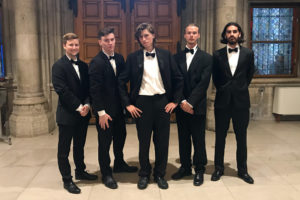
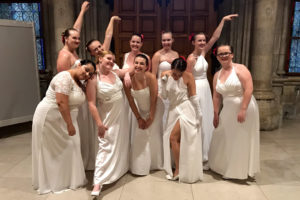
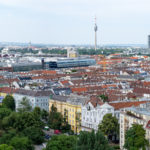
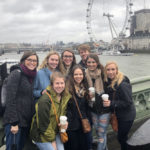
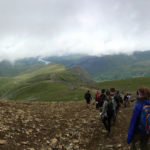
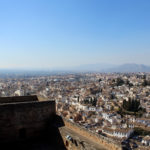
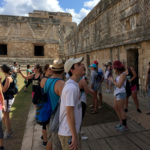












To encourage serious, intellectual discourse on Civitas, please include your first and last name when commenting. Anonymous comments will be removed.
Comments are closed.